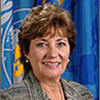Last week, the international development community celebrated the United Nations Day for South-South Cooperation, an opportunity for stakeholders to examine how developing and emerging countries can share knowledge, exchange best practices and pursue joint projects to generate tangible solutions to development challenges.
As a young officer in Argentina’s ministry of health, I attended in 1978 the first U.N. Conference on Technical Cooperation among Developing Countries, which produced the Buenos Aires Plan of Action to offer guidance and new energy to the concept of South-South cooperation. Almost at the same time, in Kazakhstan, which was then still part of the Soviet Union, the International Conference on Primary Health Care concluded with the Alma Ata Declaration, a public health milestone that recognized health as a fundamental human right.
It was an exciting time to be a part of these landmarks in public health, and see how these principles are being carried out today.


